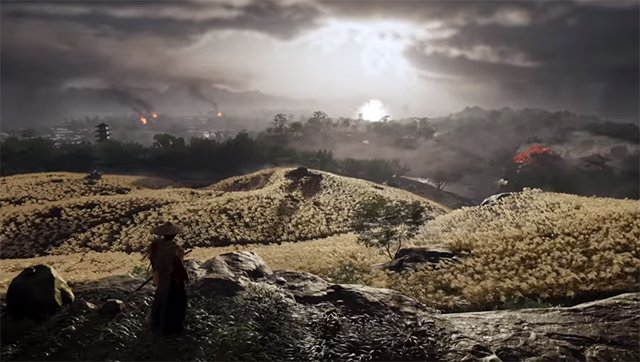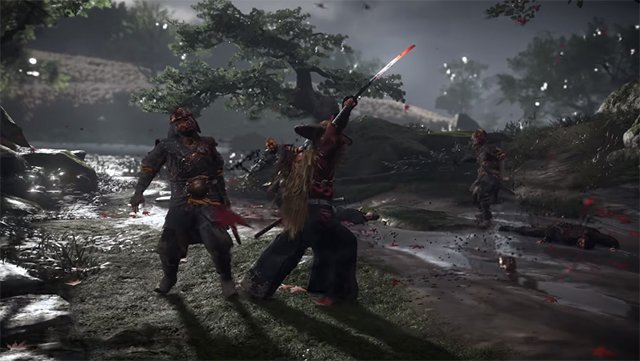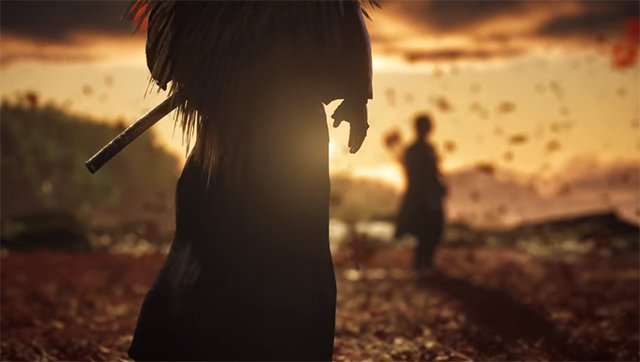Games set in Feudal Japan had quite a boon at E3 2018 thanks to Nioh 2 and Sekiro: Shadows Die Twice. But those titles are drenched in fantasy and are filled with, for lack of a better phrase, a ton of video-game-ass-video-game stuff. This leaves the door wide open for Ghost of Tsushima, Sucker Punch’s upcoming PS4 exclusive, to accurately emulate Feudal Japan instead of fantasizing about it. And while Sony is still holding it close to its chest, my recent behind-closed-doors demo gave me a better peak at the game and the authenticity that fuels it.
First of all, Sucker Punch played this hands-off demo (which was the same scene from the press briefing) live in front of us with Japanese voice acting. After all, it wouldn’t make sense that native Japanese people from 1274 would speak English. I’m not trying to spark a “subs versus dubs” war but hearing a language that accurately represents the times goes a long way in planting the player in that setting. It sounded more believable and the lips even synced for the Japanese words. However, studio co-founder Chris Zimmerman stated that a true Japanese dub might not end up in the final game because of time constraints, but they are working on a solution.
Swordplay is another key area where Sucker Punch is trying to prove their historical chops. The protagonist Jin moves with a sort of precision present in the best Japanese samurai cinema. It makes sense, given how those movies inspired the team as well as the swordfighting experts the studio brought in for motion capture. Jin’s deliberate movements are meant to convey his lethality and the game’s “mud, blood, and steel” mantra. Zimmerman stated how this spreads to the rest of the game.
“The goal that we have is to tell this grounded, relatable story where we take you there and everything else melts away,” he explained. “You’re not in your living room playing a video game; you feel like you’re there with three feet of steel in your hand about to die. And if we’ve done that, we’ve succeeded.”
This philosophy is meant to ground the game, according to Zimmerman. And while he would not go into detail about the combat (aside from how it centers around striking and countering), it stayed purely within the realm of possibility. Swift dodges and brutal counters never evolved into anime-style fireballs and a comical amount of blood. Jin is a samurai and his moveset and animation reflect that.
Ghost of Tsushima Preview: Land of the Rising Fun

The island of Tsushima also reflects Japanese culture from the time. Aside from the striking technical features, like the procedural weather and long draw distance, the world was created to represent the time period as accurately as possible. Zimmerman even stated that some of their Japanese employees say they feel like home when they lay eyes on the game’s lush greenery.
However, the optics of an American studio heavily committing to its Japanese setting might raise some eyebrows. Wes Anderson’s 2018 film Isle of Dogs came under such fire for merely using Japanese culture as a fetishized backdrop behind a story about man’s best friend. Zimmerman stated that Sucker Punch is trying to avoid such a situation in a few key ways. For starters, they worked hard to bring in consultants to ensure that things like conversation, religion, the swords, and more were period accurate.
Ghost of Tsushima Preview: PlayStation Cooperation

But, aside from claiming to have a “strong Asian presence” at Sucker Punch, they have one more tool in their belt: Sony. Sony is, obviously, a Japanese company with a ton of Japanese employees. And, given the closeness to the culture, the individuals at Sony have a bit more of a personal stake in Tsushima‘s accuracy. Not to say that European or American publishers don’t care about their historical games, but there’s a certain pride that comes with fostering the development of a game rooted deep in home territory.
Location isn’t the only way Sony is helping. Like Guerrilla Games going from Killzone to Horizon Zero Dawn and Naughty Dog making The Last of Us after the Uncharted trilogy, the console maker and publisher is willing to give their studios a long leash. Zimmerman explained that the smart business decision would have been to “keep churning out inFamous games until people stopped buying them.” Much to his delight, Sony doesn’t work like that.
“I am just so happy to part of an organization that’s like, “That’s not the way we roll. What we’re going to do is try to figure out what is the most great thing we could do and go do that and you have our blessing and our backing and our full support to go do that,” stated Zimmerman.
The authenticity that Ghost of Tsushima is hanging its kasa on is admirable because those details, on the micro and macro scale, matter. Ironically, Sucker Punch didn’t go into detail about many of those details so much of the game is still a mystery. But the studio’s track record and remarkable E3 showing make the game one of the most impressive upcoming PS4 titles. Sucker Punch has proved a lot and still has a lot to prove with Ghost of Tsushima and we will have to wait until the game comes out (whenever that is) to see if this new direction was worth taking.










